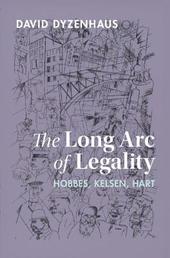
|
The Long Arc of Legality: Hobbes, Kelsen, Hart
Hardback
Main Details
| Title |
The Long Arc of Legality: Hobbes, Kelsen, Hart
|
| Authors and Contributors |
By (author) David Dyzenhaus
|
| Physical Properties |
| Format:Hardback | | Pages:500 | | Dimensions(mm): Height 234,Width 156 |
|
| Category/Genre | Social and political philosophy |
|---|
| ISBN/Barcode |
9781316518052
|
| Classifications | Dewey:340.11 |
|---|
| Audience | | Professional & Vocational | |
|---|
| Illustrations |
Worked examples or Exercises
|
|
Publishing Details |
| Publisher |
Cambridge University Press
|
| Imprint |
Cambridge University Press
|
| Publication Date |
27 January 2022 |
| Publication Country |
United Kingdom
|
Description
The Long Arc of Legality breaks the current deadlock in philosophy of law between legal positivism and natural law by showing that any understanding of law as a matter of authority must account for the interaction of enacted law with fundamental principles of legality. This interaction conditions law's content so that officials have the moral resources to answer the legal subject's question, 'But, how can that be law for me?' David Dyzenhaus brings Thomas Hobbes and Hans Kelsen into a dialogue with H. L. A. Hart, showing that philosophy of law must work with the idea of legitimate authority and its basis in the social contract. He argues that the legality of international law and constitutional law are integral to the main tasks of philosophy of law, and that legal theory must attend both to the politics of legal space and to the way in which law provides us with a 'public conscience'.
Author Biography
David Dyzenhaus is University Professor of Law and Philosophy, University of Toronto, Canada. He works on legality under stress, an interest that he developed as a law student in apartheid South Africa. As one of the leading theorists of the rule of law, his work both reshapes philosophy of law and connects its most abstract concerns to the practical dilemmas human rights lawyers face.
Reviews'Just when many legal philosophers were inclined to give in and accept the view long held by most other philosophers and legal theorists that the traditional debate about the nature of law was stalled in sectarian squabbling and anyway of dubious importance, David Dyzenhaus's magnificent book will have us starting all over again. In this creative and original rereading of the main texts, especially those of Hobbes, Hart, and Kelsen, Dyzenhaus brings the subject, and its importance, to life again. His interpretations of all three authors are controversial, but the book is the more interesting and generative for that. Dyzenhaus orchestrates a lively engagement among his predecessors-on his terms, not theirs-and an original and important theory of legal authority emerges organically in the process.' Liam Murphy, Professor of Law, Philosophy, New York University 'How the social fact of power is transformed into the normative relationship of authority is a genuine and deep puzzle in the philosophy of law. Dyzenhaus traces how legal positivists, starting with Hobbes, have attended to the way in which the law maintains a relationship of mutual respect and accountability between ruler and subject. His provocative claim is that 'long arc of legality' from Hobbes through Kelsen to Hart reveals the ways in which legal positivists have subtly incorporated insights from their major critics - the natural lawyers - to answer the question of how law can have legitimate authority for its subjects. Through careful analysis of their contributions, he develops a distinctive account of the authority of law, capable of answering the question, 'But, how can that be law for me?'' W. Bradley Wendel, Edwin H. Woodruff Professor of Law, Cornell Law School 'There are few works in contemporary legal philosophy that match its standards of quality and innovation. Dyzenhaus's book combines the virtues of originality and insight, which are typical of authors like Dworkin and Raz, with the equally important virtues of discipline, sensitivity to historical context, interdisciplinarity, and generosity in the interpretation of other authors, which mark the works of Postema and other scholars.' Thomas Bustamante, Interpretive Authority and the Kelsenian Quest for Legality, JOTWELL (July 5, 2022)
|